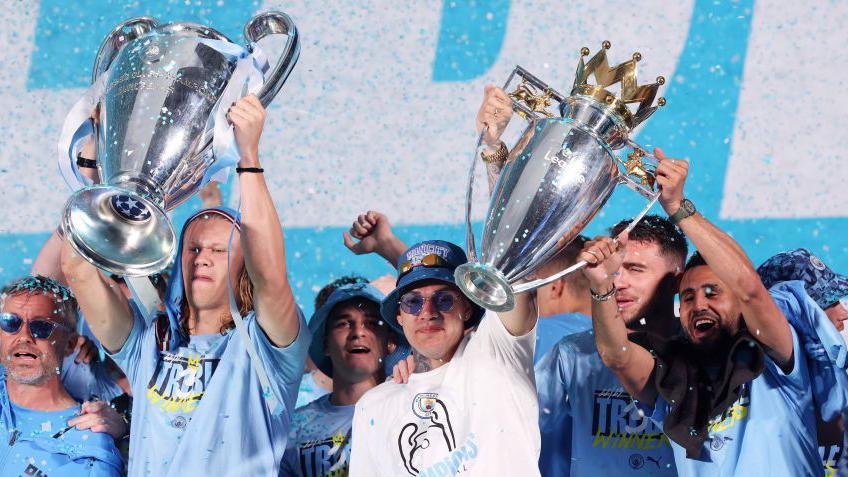Premier League teams face a dilemma balancing European competitions and domestic league performance. With a record number of English teams in Europe, the debate intensifies: will European football elevate or hinder their Premier League campaigns? The article explores historical data, expert opinions, and potential impacts on team performance and squad management.
As the excitement of European competition returns, a significant portion of Premier League clubs find themselves juggling domestic ambitions with continental aspirations. The question arises: will this dual commitment propel them to greater heights, or will it prove to be a hindrance in their Premier League campaigns?
In the 2025-26 season, an unprecedented nine English teams will grace the European stage. Arsenal, Chelsea, Liverpool, Manchester City, Newcastle, and Tottenham will compete in the prestigious Champions League, while Aston Villa and Nottingham Forest will battle in the Europa League. Crystal Palace will showcase their talent in the Conference League. This surge in European representation raises a crucial question: can clubs outside this European contingent capitalize on a less congested fixture list and enjoy the benefits of extended rest periods between matches?
To illustrate this point, one needs to look back to the 2015-16 season. Leicester City defied all expectations to claim the Premier League title, a feat achieved with a relatively light schedule of just 43 games across all competitions, unburdened by European distractions. In stark contrast, any English club aiming for European glory this season faces a gruelling itinerary of at least 55 matches, comprising 38 Premier League encounters, a minimum of two domestic cup ties, and either 15 or 17 European matches, depending on their progress through the knockout stages.
This raises a pivotal question: what do teams truly value? Is it the allure of freshness and league dominance, or the relentless grind of midweek games and international travel, with the tantalizing prospect of silverware on the horizon?
Former England defender Matt Upson, who experienced Champions League football with Arsenal and Europa League action with Stoke City, offers a player's perspective: "As a player, I always preferred to be playing. However, the sheer volume of games between now and Christmas is arguably excessive. Yet, for clubs of this stature, not participating in European football is simply not an option anymore."
Upson acknowledges the existence of a tipping point where fixture congestion becomes detrimental but emphasizes the importance of squad depth to mitigate this risk. "There is a tipping point where you can have too many games, but that's why the squads are so big - the teams in Europe have to rest players." He further asserts that players invariably favor the pursuit of multiple trophies over the relative comfort of fewer matches.
"As a player, I liked to stay in a rhythm, and playing twice a week was brilliant for me. I would enjoy that, and you felt really fit and really sharp. There is nothing like matches to get you really fit, to the level you want, certainly at this stage of the season where you are still getting into it," Upson added.
Leicester City's triumph in 2015-16 stands as a testament to the advantages of focusing solely on domestic duties. They remain one of only two teams in the Premier League era to have secured the title without the added burden of European football, with Chelsea mirroring their success the following year.
Interestingly, in the early years of the Premier League, several champions, including Manchester United (1992-93, 1995-96), Blackburn (1994-95), and Arsenal (1997-98), benefited from minimal European involvement, exiting the Uefa Cup in the early rounds.
Since the consistent qualification of four English clubs for the Champions League from 2001-02 onwards, nine teams have managed to secure a top-four finish in a season devoid of European football, with Newcastle the most recent example in 2022-23.
Conversely, a select few have conquered both the Premier League and the Champions League in the same season, including Manchester United (1998-99, 2007-08) and Manchester City (2022-23). Liverpool holds the distinction of being the only team to have won the old European Cup and the English league title in the same year, achieving this feat in both 1976-77 and 1983-84.
Crystal Palace, having already participated in seven competitive matches, including the Community Shield and two Conference League qualifiers, could potentially play 29 games in all competitions by Christmas. This contrasts sharply with teams like Bournemouth, Leeds, Manchester United, Sunderland, and West Ham, who, having been eliminated from the Carabao Cup and without European commitments, are projected to play only 18 matches by December 25.
Upson suggests that Manchester United, with their extended breaks between games, could potentially reap the rewards. However, he tempers this optimism by pointing to the current atmosphere at the training ground, which he believes may not be conducive to success. "For a team like Manchester United, the longer breaks they have got between games could be beneficial for their players. But it depends on how good the environment is at the training ground and, at the moment, I would hazard a guess that it isn't the best. So you are spending a lot of time around the training ground, with a cloud hanging over it, with things not going well on the pitch, and then you have to wait to try to put things right the following weekend."
 Image source, Getty Images
Image source, Getty ImagesEnglish clubs have been champions of Europe on 15 occasions, but they have only won the domestic league title in the same season five times
The intricate balance between European ambitions and domestic priorities will undoubtedly shape the destinies of numerous Premier League clubs in the seasons to come. Whether they embrace the challenge or succumb to its pressures remains to be seen.